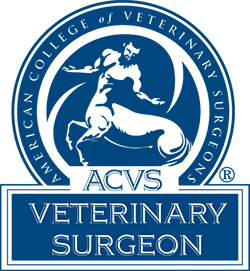
What is a Veterinary Surgeon?
- Home
- What is a Veterinary Surgeon?
All veterinarians may perform surgery as part of their veterinary practice. However, difficult cases may be best managed by a specialist. Board-certified veterinary surgeons have undergone additional training after veterinary school in order to become a specialist. This training consists of a minimum of a one-year internship followed by a three-year residency program that meets guidelines established by the American College of Veterinary Surgeons (ACVS).
During the residency there are specific training and caseload requirements that must be met. In addition to these requirements, applicants must perform research that is published in a scientific journal and then pass a rigorous examination to earn the title, “Diplomate of the American College of Veterinary Surgeons” or a “board-certified surgeon.”
Board-certified surgeons work closely with the pet owner and the primary care veterinarian before and after surgery in a team approach to ensure continuity of care for your animal. Veterinary surgeons are dedicated to providing the very best in surgical care. They also act as a resource for your primary care veterinarian by providing consultations on difficult or unusual cases. With their advanced training, these specialists offer expertise that ensures the best possible outcome for the animal and animal owner.
Reprinted from ACVS.org
